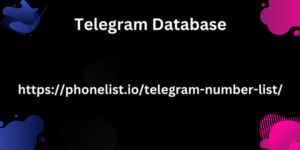Continuous Improvement: Continuously seek ways to improve the affordability and effectiveness of phone-based educational resources.
By implementing these strategies
educational institutions and organizations can develop cost-effective phone-based educational resources that are accessible to low-income communities. By leveraging open educational resources, utilizing low-cost technology, and prioritizing accessibility and inclusivity, we can ensure that everyone has the opportunity to benefit from the power of education, regardless of their socioeconomic status.
In today’s digital age, mobile
phones have become ubiquitous, even in remote areas. This presents a unique opportunity to Telegram Database revolutionize education through phone-based initiatives. However, the funding and implementation of such initiatives can be challenging. Public-private partnerships (PPPs) offer a promising solution to address these challenges and ensure widespread access to quality education.
Understanding Public-Private Partnerships
A public-private partnership is a collaborative arrangement between a government entity and one or more private sector organizations. In the context of phone-based education, PPPs can involve a variety of stakeholders, including:
Governments: Ministries
of education, technology, and finance
Private sector: Technology The Ephemeral Art of Disposable Writing companies, telecommunications providers, educational institutions, and non-profit organizations
International organizations: UNESCO, UNICEF, and the World Bank
Benefits of PPPs for Phone-Based Education
Leveraging PPPs for phone-based education offers several key benefits:
Increased Funding: PPPs can bring together significant financial resources from both public and private sources, ensuring adequate funding for the development, implementation, and maintenance of phone-based educational initiatives.



